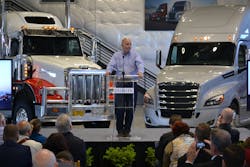MADRAS, OR. The new president and CEO of Daimler Trucks North America (DTNA) said he does not expect any shake-up of the North American Free Trade Agreement (NAFTA) or Phase 2 greenhouse gas rules.
“I don’t anticipate any major changes in the NAFTA trade agreement,” said Roger Nielsen. “I think there are so many other discussions going on with government priorities right now, I don’t see this as coming up to the top of the list.”
Nielsen made the comments during his first roundtable with reporters since being elevated from chief operating officer on April 1. He was in Madras to officially open DTNA’s new test track.
President Trump previously threatened to withdraw from NAFTA, but more recently indicated a desire to renegotiate certain terms of the deal with Canada and Mexico.
“We’re a global company,” said Nielsen. “We believe in free trade, and we’re prepared to engage anybody and everybody in discussions about what that means,” he said.
Nielsen added that in the event there was a shift in trade policy, the company would be prepared. “If you take the worst case scenario and say there was a situation where we would be required to have 100 percent . . . assembled in America, we have the capacity to do it.”
He added he is confident the company’s component suppliers would be ready as well.
His message was similar when asked about the Phase 2 greenhouse gas regulations, with implementation scheduled to begin January 2018.
He said cooperation between industry and Obama administration created a path over the next decade to not only reduce emissions, but make 10 miles per gallon in a diesel truck a regular occurrence.
“We don’t see that changing. At the moment, there has been no discussions about changing it,” he said.
Nielsen joined Freightliner, now DTNA’s parent company, in 1986, and has been COO since 2001.
Though Nielsen has not regularly interacted with the media during his career, he was clearly at ease as he addressed a wide range of questions for more than 35 minutes.
He said the Daimler leadership transition, starting with Wolfgang Bernard’s decision to resign as head of the global commercial vehicles unit earlier this year, was a “surprise.”
He said Daum moving into that role “reflects the achievements we have been able to have here in North America.”
Nielsen was “absolutely in shock” when Daum offered him the top position at DTNA, and humbly joked he is likely “to get credit for a lot of things Martin put in place.”
As COO, Nielsen had regular interactions with maintenance executives. Now, as CEO, those discussions are more with the top decision makers of fleets that purchase Freightliner and Western Star trucks.
That started with a 13-customer blitz in 13 different cities over five days, he said.
Besides maintaining DTNA’s position as “the on-highway leader,” he said one goal is to become top seller in the vocational space.
As for the current market, he reiterated DTNA’s earlier sales projection of 350,000 for Classes 6-8 for the NAFTA market this year.
Incoming orders reflect a more equal mix between the largest fleets and smaller ones.
Many of the large firms went on a buying spree over the past few years, bringing their average fleet age down.
Nielsen said customers in the dry van sector are struggling to get rate increases from shippers due to intense competition. Combined with slipping prices on the used truck market, some fleets “not so eager to freshen up their trucks,” which may still be under warranty and running well.
Customers waiting for the full range of next generation Cascadia models are also impacting current order intake, he suggested.
Nielsen declined to respond when asked about Elon Musk’s suggestion Tesla will unveil a long haul electric Class 8 truck in September, other than saying “it is an interesting company to watch.”
As for the overall electric truck market, he said there continues to be advances in electric battery power, and it likely makes sense for light-duty vehicles and short hauls.
After declaring Daimler plans to be the leader in the electric commercial vehicles space, he questioned if the technology and related infrastructure will be ready in the near-term to allow long haul truckers, who try to avoid stopping, to experience “a drive like he does today, without energy insecurity.”
About the Author
Neil Abt
Neil Abt is a former FleetOwner editor who wrote for the publication from 2017 to 2020. He was editorial director from 2018 to 2020.
